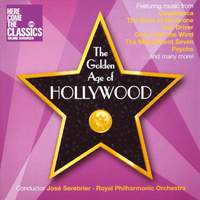Interview,
José Serebrier on Dvorak
 Uruguayan conductor José Serebrier has just completed his mammoth Dvorak set - the complete symphonies, plus other orchestral works, with the Bournemouth Symphony Orchestra.
Uruguayan conductor José Serebrier has just completed his mammoth Dvorak set - the complete symphonies, plus other orchestral works, with the Bournemouth Symphony Orchestra.
I asked him about his relationship with these works, in particular the First Symphony (long suspected to harbour copyists' errors never hitherto addressed), and about his future plans in the studio and concert hall.
Where did the idea come from to record a complete set of symphonies? Is this an ambition that you've had for a long time?
The idea for this particular cycle came from the Bournemouth Symphony Orchestra, who wanted me to a record Classical or Romantic, standard works with them, and we came up with Dvorak, since Warner Music didn't have a complete Dvorak cycle. I love Dvorak, and I’ve previously recorded the Symphony No. 9 twice, so this is my third recording of that work. And I’d recorded No. 8 once, but none of the others – so I’m delighted! I really love this music.
You mention that you've made some changes to the early work, the symphony The Bells of Zlonice. How did you first come to the conclusion that these changes were necessary?
Yes, this is the first recording of the real, complete First Symphony. I’m a composer myself so I took the decision to fix some things that were obviously a copying error. Very few recordings exist of the First Symphony, but they all play this error! And it makes no sense whatsoever for 20 bars. It’s in two different tonalities, and Dvorak didn’t write polytonal music in the 1870s. After consulting musicologists, composers… it seemed obvious to me, and to anybody! I listened to recordings of the First Symphony, and at the end of the last movement there is a clash of tonalities that doesn’t make any sense; it’s nonsense.
Dvorak wrote it when he was 21, for a competition in Austria. And he sent the score off to the competition and never saw it again – they never bothered to return it. And so he never had it, it was never returned, and he never heard it; if he had it, he would have fixed the errors, of course. It’s a mistake, there’s no question about it. It’s clashing polytonality and it doesn’t make any sense whatsoever. I’m really surprised that so many conductors have recorded it without correcting these obvious copying errors.
It was published for the first time in the 1930s. But I agonised over it – I didn’t know what to do! And I consulted everybody I could think of. I played it for composers, I even played it for descendants of Dvorak’s family. I wanted to do the right thing. And by the end, after consulting dozens of musicologists and composers and musicians I concluded that it was a mistake and I would fix it – an honest mistake, because Dvorak never saw the score again. So it had to be fixed!
If you had to pick one of Dvorak's symphonies to take with you to a desert island, which would it be?
I would take all of them! I love them all, it’s hard to decide which one. They all have beauty in them. My favourite moments in all the Dvorak symphonies are always the slow movements and the scherzos. The scherzos are just fantastic –in every one of the nine symphonies – and the slow movements are made in Heaven. Really, I couldn’t choose one. I seem to favour the Eighth Symphony and the Seventh, but the earlier symphonies are real gems, I should play them more – they’re unbelievable. They’re really the true Dvorak. 1, 2, 3 and 4 are just as great as 5, 6, 7, 8 and 9.
The thing about the later symphonies of Dvorak, is that they’re simpler, more direct. The earlier symphonies are much more complicated; he seems to have become much more public-oriented as he progressed – which is the opposite of Beethoven. As Beethoven progressed he became much more difficult; the later symphonies of Beethoven are more elanborate; it’s amazing. Dvorak went the opposite way, they become simpler and simpler – in the best sense!
Where do you go from here? After such a huge project, what's on the horizon for you next - other than a well-earned rest?
Having a rest? There’s no rest… I’m recording this week, music by a Chinese composer called Xiaogang Ye with the RPO; then I go to South America for a tour, then Canada for another tour, and then I come back to London to record with the Philharmonia Orchestra – music by British composer John Powell, who wrote music for many Hollywood films – the Bourne Trilogy, Mr and Mrs Smith, How to Train Your Dragon – and I conducted the music for his newest film Rio 2. I’m making two records of music. Then I come back in November to conduct the RPO at the Albert Hall in a concert called ‘The Golden Age of Hollywood’, with music from that period. So it doesn’t stop! In between I have tours of China, and so on… and I’m recording a whole series of Tchaikovsky – I don’t have any particular style. I did a box just last year, actually – the complete symphonies of Glazunov – also on Warner Classics, and that was enormously successful. Dvorak's music is close to me, I’m very pleased about this new box. It’s my biggest accomplishment.
José Serebrier's complete Dvorak cycle with the Bournemouth Symphony Orchestra was released last week on Warner Classics.
Available Formats: MP3, FLAC
Other discs from José Serebrier
Serebrier conducts the RPO in a selection of some of the best-loved and enduringly popular themes from the big screen - the turbulent Warsaw Concerto, sweeping Western epics, Ben-Hur and more!
Available Formats: CD, MP3, FLAC
The Royal Scottish National Orchestra perform Glazunov's Symphony No. 6, plus two tone-poems - just one of Serebrier's acclaimed Glazunov recordings.
Available Formats: MP3, FLAC
Serebrier has recorded numerous albums of transcriptions and arrangements by the great orchestrator Leopold Stokowski; here the famous Toccata and Fugue (of Fantasia fame) has pride of place among a selection of works by Bach.
Available Formats: CD, MP3, FLAC






